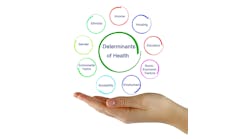Cleveland Clinic plans to double the staff of its Center for Community Health Workers over the next month.
Cleveland Clinic’s community health workers are part of the clinical teams within emergency medicine, primary care and women’s health. They collaborate with patients who experience barriers to accessing medical care and daily essentials such as food, housing, employment and childcare. They work as facilitators, translators and advocates, connecting individuals to needed resources.
Cleveland Clinic said its Center for Community Health Workers is one of the first programs of its kind at an academic medical center, and the only one to be led by a certified community health worker.
Established in November 2021 by a multimillion-dollar gift from the Jones Day Foundation, the program continues to sustain and grow with support from philanthropic gifts of all sizes. The program has trained 10 community health workers and aims to recruit an additional 10 people from the community to meet the needs of more patients.
“It’s neighbors helping neighbors,” said Vickie Johnson, Chief Community Officer at Cleveland Clinic, in a statement. “Our community health workers are passionate advocates who serve in their own neighborhoods and receive specialized training in health equity. Their focus is always on how they can help patients lead the healthiest lives.”
Community health workers invest time by gaining a strong understanding of a patient’s journey, conducting home visits and providing ongoing support to build trust and rapport with individuals.
Patients are seen at the Akron General Medical Office Building, Beachwood Family Health and Surgery Center, Euclid Hospital, Fairview Hospital, Hillcrest Hospital, Lakewood Family Health Center, Langston Hughes Community Health and Education Center, and the Stephanie Tubbs Jones Health Center.
“Our long-term goal is to see community health workers deployed across our enterprise,” said Thao-Vi Dao, M.D., an internist, pediatrician and medical director of Cleveland Clinic’s Center for Community Health Workers, in a statement.
To date, the team has screened more than 1,000 patients for medical and social needs and referred more than 500 patients to free community services. The most common social needs addressed by the program are food insecurity, housing instability, transportation and overdue utilities.
Expectant mothers with high-risk pregnancies who live in Cuyahoga County represent the largest demographic of patients served by Cleveland Clinic’s community health workers.
“Our community health workers do so many amazing things to support moms throughout their pregnancy,” said Dao. “They help arrange transportation, which is one of the biggest barriers to completing prenatal care. They pick up groceries from the food bank and drop it off at the patient’s home. Just knowing that you have somebody on your side who cares about you and wants you to do well is extremely powerful.”
Plans are underway to expand services to pediatrics and inpatient care for the management of chronic conditions such as hypertension, diabetes and kidney disease.


